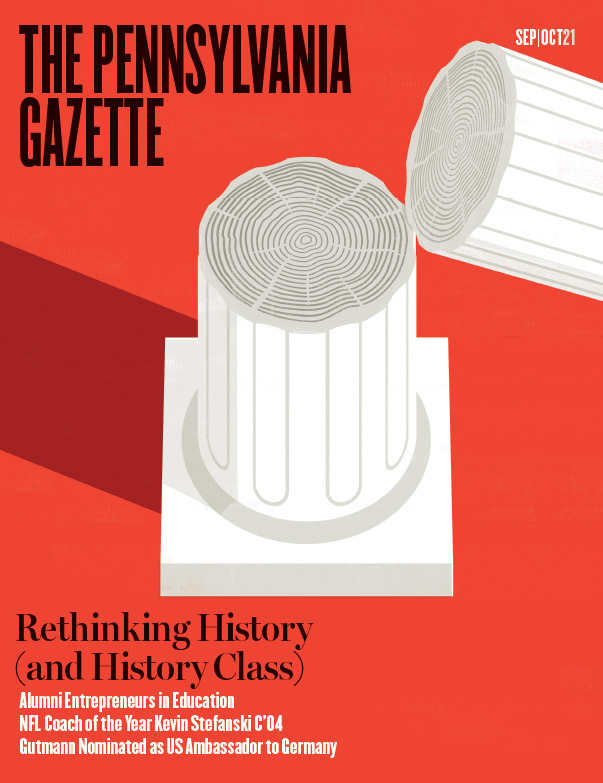Collaborative spirit, not-so-settled law, and more.
Edifying and Inspiring
I found the article “Compact Fulfilled” [Nov|Dec 2021] edifying and inspiring. Among President Amy Gutmann’s notable achievements is her efforts to promote interdisciplinary collaboration through the creation of 26 PIK professorships. Such collaborative ventures are a unique asset of multidisciplinary research institutions such as Penn. Further exploring such collaborative ventures from the standpoint of the involved professor, students, and alumni would provide an interesting follow-on article for the Gazette.
While at Penn Law in 1971, I received a competitive grant to conduct a summer field study of neighborhood defense leagues in Boston, Newark, and Philadelphia from Marvin Wolfgang’s Center for the Study of Criminology and Criminal Law. In addition to the sociological-related research accomplished, I was able to also produce a Penn Law Review article on the constitutional rights and limits of such citizen groups to associate in fighting neighborhood crime. I consider the experience a key highlight of my law school experience.
David Keehn L’72, Leeds, MA
Inexpert Commentary
Universities typically require scholarship to reside within the core competency of the scholar. The story “Compelling Argument,” with a subhead stating that “The case for mandatory vaccinations is ‘settled law’”[“Gazetteer,” Nov|Dec 2021], takes a different approach. The Gazette cites an epidemiologist for a legal conclusion that governments can force vaccinations on citizenry. I’m sure this fellow is an excellent epidemiologist, but what does he know about law?
This legal expert cites a 1905 case, Jacobson v. Massachusetts,as bedrock authority for vaccination mandates. But Jacobson has no relationship to measures taken today. To start, Jacobson involved a $5 fine ($140 in today’s dollars). Would anyone equate this to losing one’s job, as happens today with regularity? Jacobson operated under a state statute, but today, governors enforce these mandates under executive orders, not legislation. And then there is the federal government (which Jacobson did not address), which has already been told by the courts it does not have authority to issue vaccine mandates in many settings.
If Jacobson is settled law, this means other cases have followed it throughout the years. Buck v. Bell was one such case. Here’s what Justice Holmes wrote [in 1927] in upholding a state’s right to involuntarily sterilize women deemed imbeciles: “The principle that sustains vaccinations is broad enough to cover cutting the Fallopian tubes. Jacobson v. Massachusetts, 197 U.S. 11. Three generations of imbeciles are enough.” Buck v. Bell has not been expressly overruled. Would our expert call it settled law?
Then we are told an ACLU decision not to take a measles vaccination case should carry legal weight. This scary superficiality says nothing about what is settled law.
I’m confident forced vaccinations play well in the rarefied air of the Gazette audience. It’s good that people enjoy this medical option, but forced vaccinations present a number of complex legal issues. Next time, publish a speech made by an epidemiologist about epidemiology, not the law.
Creighton Meland W’78, Hinsdale, IL
Motion Seconded
Linda R. Falcao’s letter [“Letters,” Nov|Dec 2021] advocating ways Penn should recognize and honor Katalin Kariko’s contribution to the world’s health are right on point. I support them all at the very least.
Leonard M. Pakman C’56 Gr’64, Abington, PA
In Quest of Better Questioning
“Rethinking History” [Sep|Oct 2021] brought back memories from the 1960s of sitting in a lecture class with a hundred other students being introduced to US history. For the next 50 years, little did change in the teaching of history until the era of Professors Licht and Brown’s work. It is interesting that the impact of the growth of AP US History in high schools is cited as affecting the moves to a new approach in pedagogy of history. The influence of Licht, Brown, and others can now be found not only in universities but also in high schools today. In fact, the AP US History program has changed to reflect an emphasis on critical thinking beyond factual retention. As a coauthor of a popular AP US history textbook, for the past 25 years we have responded to this evolution in instruction, moving from the traditional chapter format to themes and topics in history. Kudos to those at Penn who have helped lead the way to moving students from simply knowing history to better questioning it.
John M. Schmalbach GrEd’77, Maple Glen, PA
Artful Cover

I wanted to convey a big bravo! to the illustrator [Chris Gash] who authored the cover of the Sep|Oct 2021 issue. Cool, witty, smart, and brilliant.
Cyrille Arnould WG’91, Luxembourg

